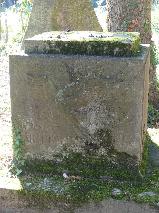Binding, Rudolf G. |
| AUTHOR (GERMANY) |
|
BORN 13 Aug 1867, Basel - DIED 4 Aug 1938, Starnberg, Bayern BIRTH NAME Binding, Rudolf Georg CAUSE OF DEATH tuberculosis GRAVE LOCATION Freiburg im Breisgau, Baden-Württemberg: Hauptfriedhof, Friedhofstrasse (near the pond) |
|
Rudolf Binding came from a wealthy family. His father Karl Lorenz Binding (1841-1920) was a lawyer who was specialised in criminal law. In 1870 the family moved from Basel to Freiburg im Breisgau. After the Franco-Prussian way Karl worked at the University of Strasbourg before he settled with his family in Leipzig in 1873. Rudolf studied law and medicine in Tübingen, Heidelberg and Berlin. But he was mainly interested in writing and horse racing and became a racing rider and horse breeder himself. He travelled to Italy and Greece on study trips. In 1907 he married his cousin Helene Wirsing but they separated in 1913 and divorced in 1919. From 1910 he lived in the new settlement Buchschlag near Frankfurt am Main and he became its first mayor in 1913. During the First World War he served as a staff officer. He noted the absurdity of war as early as 1914 in his diary. After the war he worked as a freelance writer. In 1919 he published his short story "Keuschheitslegende" ("The Legend of Chastity"). In the same year he divorced Helene and after his relationship with Eva Connstein (born Eva Annecke, 1877-1942) ended in 1922, Hedwig Blaser-Blanc became his second wife. "Aus dem Kriege" (1925) was based on his war diaries. In 1928 he won a silver medal at the Olympic Games in Amsterdam for his poetic story "Reitvorschrift für eine Geliebte". His work was popular during the Weimar republic as well as in the nazi era. His novella "Moselfahrt aus Liebeskummer, Novelle in einer Landschaft" was published in 1932 and filmed in 1953 by Kurt Hoffmann. In "Antwort eines Deutschen an die Welt" (1933) he defended nazi Germany against its critic Romain Rolland. In 1933 his name was on the list of 88 authors who pledged their loyalty to Adolf Hitler. He probably was not consulted about this, but he accepted it. Although he had his reservations against the nazis he was useful for their propaganda purposes. In 1935 his marriage to Hedwig ended after she returned to Switzerland with their son Enzian. In 1933 he had met Elisabeth Jungmann who had been secretary to Gerhart Hauptmann since 1922. They became lovers and she also became his secretary. Together they settled in Starnberg in 1935. Because she was Jewish he was unable to marry her, but his status protected her. But Binding did not make a will and after his death in 1938 she was forced to emigrate to England without a penny. She would eventually marry her friend Max Beerbohm shortly before his death in 1958. She had met Beerbohm in Rapallo in 1927 in the service of Hauptmann and often visited him afterwards at his house in that city. Rudolf Binding was buried in the grave of his father at the Hauptfriedhof in Freiburg im Breisgau. Family • Father: Binding, Karl Related persons • visited Hesse, Hermann |
| Images |
Sources • Rudolf G. Binding - Wikipedia (DE) • Deutsche Biographie - Binding, Rudolf • Randerscheinungen - DER SPIEGEL |



